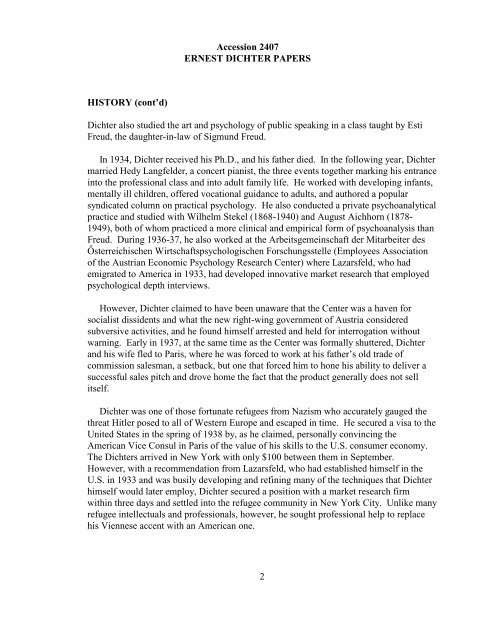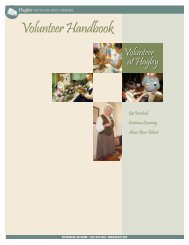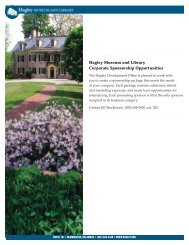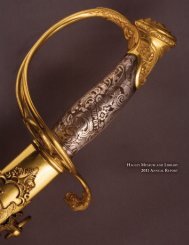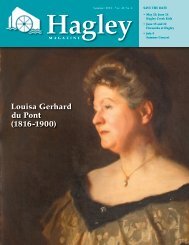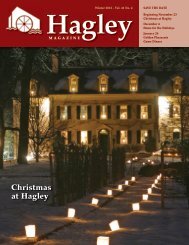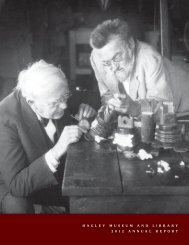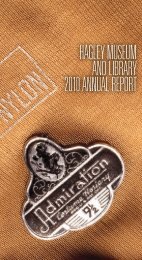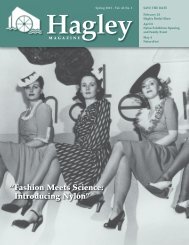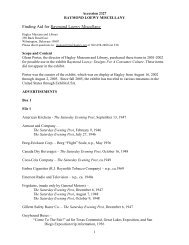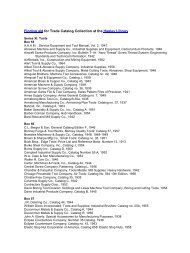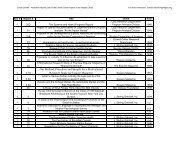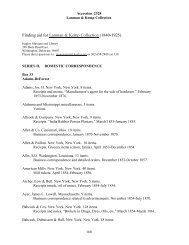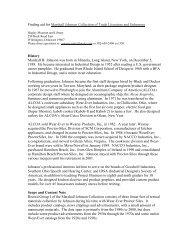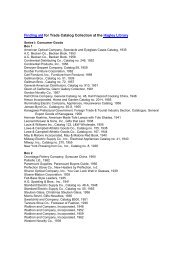Ernest Dichter Papers - Hagley Museum and Library
Ernest Dichter Papers - Hagley Museum and Library
Ernest Dichter Papers - Hagley Museum and Library
Create successful ePaper yourself
Turn your PDF publications into a flip-book with our unique Google optimized e-Paper software.
HISTORY (cont’d)<br />
Accession 2407<br />
ERNEST DICHTER PAPERS<br />
<strong>Dichter</strong> also studied the art <strong>and</strong> psychology of public speaking in a class taught by Esti<br />
Freud, the daughter-in-law of Sigmund Freud.<br />
In 1934, <strong>Dichter</strong> received his Ph.D., <strong>and</strong> his father died. In the following year, <strong>Dichter</strong><br />
married Hedy Langfelder, a concert pianist, the three events together marking his entrance<br />
into the professional class <strong>and</strong> into adult family life. He worked with developing infants,<br />
mentally ill children, offered vocational guidance to adults, <strong>and</strong> authored a popular<br />
syndicated column on practical psychology. He also conducted a private psychoanalytical<br />
practice <strong>and</strong> studied with Wilhelm Stekel (1868-1940) <strong>and</strong> August Aichhorn (1878-<br />
1949), both of whom practiced a more clinical <strong>and</strong> empirical form of psychoanalysis than<br />
Freud. During 1936-37, he also worked at the Arbeitsgemeinschaft der Mitarbeiter des<br />
Ősterreichischen Wirtschaftspsychologischen Forschungsstelle (Employees Association<br />
of the Austrian Economic Psychology Research Center) where Lazarsfeld, who had<br />
emigrated to America in 1933, had developed innovative market research that employed<br />
psychological depth interviews.<br />
However, <strong>Dichter</strong> claimed to have been unaware that the Center was a haven for<br />
socialist dissidents <strong>and</strong> what the new right-wing government of Austria considered<br />
subversive activities, <strong>and</strong> he found himself arrested <strong>and</strong> held for interrogation without<br />
warning. Early in 1937, at the same time as the Center was formally shuttered, <strong>Dichter</strong><br />
<strong>and</strong> his wife fled to Paris, where he was forced to work at his father’s old trade of<br />
commission salesman, a setback, but one that forced him to hone his ability to deliver a<br />
successful sales pitch <strong>and</strong> drove home the fact that the product generally does not sell<br />
itself.<br />
<strong>Dichter</strong> was one of those fortunate refugees from Nazism who accurately gauged the<br />
threat Hitler posed to all of Western Europe <strong>and</strong> escaped in time. He secured a visa to the<br />
United States in the spring of 1938 by, as he claimed, personally convincing the<br />
American Vice Consul in Paris of the value of his skills to the U.S. consumer economy.<br />
The <strong>Dichter</strong>s arrived in New York with only $100 between them in September.<br />
However, with a recommendation from Lazarsfeld, who had established himself in the<br />
U.S. in 1933 <strong>and</strong> was busily developing <strong>and</strong> refining many of the techniques that <strong>Dichter</strong><br />
himself would later employ, <strong>Dichter</strong> secured a position with a market research firm<br />
within three days <strong>and</strong> settled into the refugee community in New York City. Unlike many<br />
refugee intellectuals <strong>and</strong> professionals, however, he sought professional help to replace<br />
his Viennese accent with an American one.<br />
2


